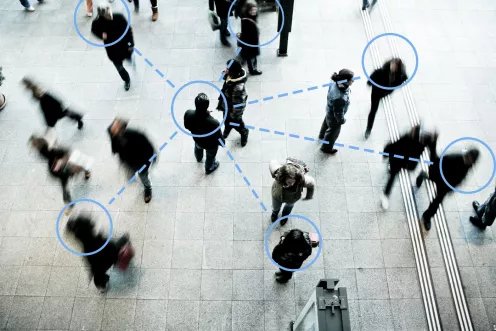
Retrospective Contact Tracing: How States Can Investigate Covid-19 Clusters
Video & Podcast: A conversation with experts on how US states can implement retrospective contact tracing
A session exploring how US state and local public health leaders can implement retrospective contact tracing to identify Covid-19 clusters and mitigate their spread, held by the Berkman Klein Center for Internet & Society at Harvard University, Harvard Medical School’s Program in Global Public Policy and Social Change, the National Governors Association, and Partners In Health’s U.S. Public Health Accompaniment Unit.
Currently, almost every US state relies on prospective contact tracing: when an infected person is identified, contact tracers try to identify and notify the infected person’s contacts since being infected. However, there’s an additional, effective method that states can add to their toolkit: retrospective tracing. Once tracers identify an infected person, they can look backwards to find when and where the person was infected and identify who else might have been infected simultaneously as part of a ‘cluster’. Experts are increasingly aware of the outsized effects of superspreader incidents in the transmission of COVID-19 — these are occasions where one or a few persons infect a disproportionate number of other individuals due to a combination of environmental factors, timing, and the activities people are engaged in. As pioneered by Japanese scientists and officials, retrospective tracing identifies those events and allows tracers to discover more cases, more efficiently.
For more information on retrospective contact tracing, read a policy memo detailing key features of retrospective contact tracing and laying out five recommendations for state and local public health authorities.
Participants
Dr. Hitoshi Oshitani, a member of Japan’s Subcommittee on Novel Coronavirus Disease Control whose pioneering work helped develop the retrospective tracing methodology, presents on the retrospective tracing methodology, how it was developed, and how it has been implemented in Japan.
Dr. KJ Seung, chief of strategy and policy for Partners in Health’s MA COVID-19 Response, Associate Physician at the Division of Global Health Equity at Brigham and Women's Hospital, and Assistant Professor at the Department of Global Health and Social Medicine at Harvard Medical School presents on how the state of Massachusetts is implementing retrospective tracing methodologies.
Professor Zeynep Tufekci, a techno-sociologist at the University of North Carolina who writes publicly on pandemic response for outlets including The Atlantic and is a member of the Berkman Klein Center’s Digital Pandemic Response Working Group, joins Drs. Seung, Oshitani, and Bourdeaux for a question and answer panel focused on implementation of this methodology.
Dr. Margaret Bourdeaux, Research Director of the Program in Global Public Policy and Social Change and co-lead of the Berkman Klein Center’s Digital Pandemic Response Policy Practice, introduces and moderates the session.
Learn more about the Berkman Klein Center’s Digital Pandemic Response Policy Practice.
Download original video and audio from this event





